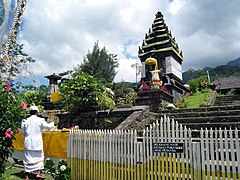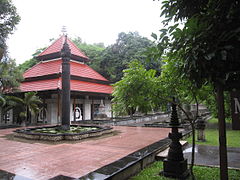
Java
Java[a] is one of the Greater Sunda Islands in Indonesia. It is bordered by the Indian Ocean to the south and the Java Sea to the north. With a population of 151.6 million people, Java is the world's most populous island, home to approximately 56% of the Indonesian population.[3] Indonesia's capital city, Jakarta, is on Java's northwestern coast.
This article is about the Indonesian island. For the programming language, see Java (programming language). For other uses, see Java (disambiguation).
Native name: Jawa (Indonesian)
124,413 km2 (48,036 sq mi)
13th
3,678 m (12067 ft)
Jakarta (pop. 10,562,088)
151,600,000[1] (2020)
1,219/km2 (3157/sq mi)
Javanese (inc. Tenggerese, Osing, Banyumasan),
Sundanese (inc. Baduy, Bantenese, Cirebonese),
Madurese (inc. Bawean, Pendalungan),
Betawi,
Malays etc.
- WIB (UTC+7)
Many of the best known events in Indonesian history took place on Java. It was the centre of powerful Hindu-Buddhist empires, the Islamic sultanates, and the core of the colonial Dutch East Indies. Java was also the center of the Indonesian struggle for independence during the 1930s and 1940s. Java dominates Indonesia politically, economically and culturally. Four of Indonesia's eight UNESCO world heritage sites are located in Java: Ujung Kulon National Park, Borobudur Temple, Prambanan Temple, and Sangiran Early Man Site.
Java was formed by volcanic eruptions due to geologic subduction of the Australian Plate under the Sunda Plate. It is the 13th largest island in the world and the fifth largest in Indonesia by landmass, at about 138,800 square kilometres (53,600 sq mi). A chain of volcanic mountains is the east–west spine of the island.
Four main languages are spoken on the island: Javanese, Sundanese, Madurese, and Betawi. Javanese and Sundanese are the most spoken.[4] The ethnic groups native to the island are the Javanese in the central and eastern parts and Sundanese in the western parts. The Madurese in the Eastern salient of Java are migrants from Madura Island, while the Betawi in the capital city of Jakarta are hybrids from various ethnic groups in Indonesia. Most residents are bilingual, speaking Indonesian (the official language of Indonesia) as their first or second language. While the majority of the people of Java are Muslim, Java's population comprises people of diverse religious beliefs, ethnicities, and cultures.[5]
Java is divided into four administrative provinces: Banten, West Java, Central Java, and East Java, and two special regions, Jakarta and Yogyakarta.
Java is divided into four provinces and two special regions:



